|
|
|
Sort Order |
|
|
|
Items / Page
|
|
|
|
|
|
|
| Srl | Item |
| 1 |
ID:
158734


|
|
|
|
|
| Summary/Abstract |
The results of the 2002 general election in Turkey came as a powerful shock to multifarious circles both within and outside the country. There were deep concerns that the ‘moderate’ Islamic-oriented Justice and Development Party (AKP) might try to dismantle the very bases of the secular state. Fifteen years of AKP rule have displayed four distinctively different periods: (1) Normalization and reinstitution of civil governance (2002–2007); (2) Methodological transition (2007–2009); (3) Consolidation of power-base (2009–2011); and (4) De-secularization, de-democratization, re-securitization and shift to authoritarianism (2011–2016). Drawing upon the ‘competitive authoritarianism’ literature and the concept of ‘instrumentalization of democracy,’ this article will elaborate the above points as well as the intrinsic Islamist mindset of the AKP. Use of foreign policy as an instrument of legitimation of Islamist policies and anti-secular transformation will also be examined.
|
|
|
|
|
|
|
|
|
|
|
|
|
|
|
|
| 2 |
ID:
191022
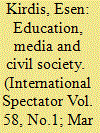

|
|
|
|
|
| Summary/Abstract |
The Turkish economy is in freefall with rising inflation, unemployment, poverty and income inequality. Yet, the incumbent Justice and Development Party (JDP) continues to get the support of roughly one-third of the voters according to the latest surveys. Although this is a long way from the peak of the party when it was getting half the overall votes a decade ago, it is nevertheless a significant proportion of the voter base. What explains such a vote? More generally, why do people vote against their own material interests? Looking at the JDP’s twenty-year incumbency, it can be argued that the JDP created party identification amongst a particular set of Turkish voters by utilising religious institutions, the education system, the media and civil society to construct its cultural hegemony.
|
|
|
|
|
|
|
|
|
|
|
|
|
|
|
|
| 3 |
ID:
193637


|
|
|
|
|
| Summary/Abstract |
This paper explains and corroborates the mechanism by which civic and political spaces opposed to Hindu nationalism were attacked, especially after the arrival of the right-wing Hindu nationalist Bharatiya Janata Party (BJP) government in 2014. Three mechanisms are discerned for replacing pluralistic values with Hindu majoritarian ones. Sometimes institutions are just allowed to drift by interpreting old rules in new ways. For example, no formal rules for media control have changed but the government’s control over media has increased substantially. At other times, incremental legal and policy changes are executed to make the change explicit, often building on a new moral purpose. To give another example, the FCRA (2010) was amended and weaponized against NGOs in a layered way in 2020. Finally, when political opposition is weak, institutions that have provided guarantees for protecting diversity have simply been displaced by new and radically different ones. This was the case with abrogating Article 370, which converted the special status of the sub-national state of Jammu and Kashmir to the status of two federally administered union territories—Jammu and Kashmir and Ladakh. These mechanisms place India in a competitive authoritarian frame, where electoral majorities are deployed to systematically attack the political opposition, thereby making it more difficult for it to rise. Despite these propensities, opposition parties have won elections in some of India’s sub-national states. The challenges facing the world’s most populous democracy are significant, even though competitive elements co-exist. These elements in a competitive authoritarian regime, however, are under severe stress. India’s democratic credentials can be revived only if the competitive elements of India’s democracy stand united against ethno-nationalist Hindu majoritarianism.
|
|
|
|
|
|
|
|
|
|
|
|
|
|
|
|
| 4 |
ID:
153317
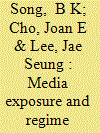

|
|
|
|
|
| Summary/Abstract |
This study explores whether and how exposure to mass media affects regime support in competitive authoritarian regimes. Using geographical and temporal variation in newspaper circulation and radio signal strength in South Korea under Park Chung Hee's competitive authoritarian rule (1961–1972), we find that greater exposure to media was correlated with more opposition to the authoritarian incumbent, but only when the government's control of the media was weaker. When state control of the media was stronger, the correlation between media exposure and regime support disappeared. Through a content analysis of newspaper articles, we also demonstrate that the regime's tighter media control is indeed associated with pro-regime bias in news coverage. These findings from the South Korean case suggest that the liberalizing effect of mass media in competitive authoritarian regimes is conditional on the extent of government control over the media.
|
|
|
|
|
|
|
|
|
|
|
|
|
|
|
|
| 5 |
ID:
173687
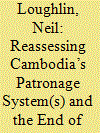

|
|
|
|
|
| Summary/Abstract |
The dominant literature on Cambodian politics over the past two decades suggested that a mixture of elite and mass clientelism had enabled the hegemonic Cambodian People’s Party (CPP) to rule via competitive but authoritarian elections, while lessening its previous reliance on repression and violence. Such explanations did not predict the upswing in contestation in the country in 2013 and thereafter. Neither do they account for the crackdown that followed. Following literature that draws attention to the tensions in building and maintaining political coalitions under authoritarianism, and demonstrating the difficulties in maintaining competitive authoritarianism over time, this article draws attention to structural, institutional, and distributional impediments to the CPP leadership in building and maintaining effective reciprocal relations with electoral clients while simultaneously balancing the interests of the military and other elites at the core of the regime. To make its argument, the article compares weaknesses in the CPP’s electoral clientelism with the effectiveness of patronage within the security forces, seen through the lens of Cambodia’s experience of land dispossession. It shows that an extractive and exclusive political economy privileged the interests of regime insiders over potential mass electoral clients precisely during the same period the CPP was supposed to be securing its hold on power via mass electoral clientelism. This further explains why the regime fell back on repression over reform in response to the upswing in contestation manifest from 2013, and why, despite the failings of its mass patronage project, repression has nevertheless been successful as a strategy for regime survival during a period of heightened popular contestation.
|
|
|
|
|
|
|
|
|
|
|
|
|
|
|
|
| 6 |
ID:
148258
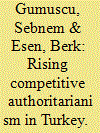

|
|
|
|
|
| Summary/Abstract |
Since the Justice and Development Party (AKP) came to power in 2002 Turkey has undergone double regime transitions. First, tutelary democracy ended; second, a competitive authoritarian regime has risen in its stead. We substantiate this assertion with specific and detailed evidence from 2015 election cycles, as well as from broader trends in Turkish politics. This evidence indeed confirms that elections are no longer fair; civil liberties are being systematically violated; and the playing field is highly skewed in favour of the ruling AKP. The June 2015 election results and their aftermath further confirm that Turkey has evolved into a competitive authoritarian regime.
|
|
|
|
|
|
|
|
|
|
|
|
|
|
|
|
| 7 |
ID:
133769
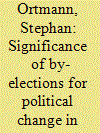

|
|
|
|
|
| Publication |
2014.
|
| Summary/Abstract |
By-elections in Singapore have played a different role depending on whether the country can be characterized as a hegemonic or competitive authoritarian regime. During the former, the ruling party was able to instrumentalize by-elections for leadership renewal and enhance its power. Conversely, they aided opposition parties as well, providing them a training ground.
|
|
|
|
|
|
|
|
|
|
|
|
|
|
|
|
| 8 |
ID:
189000


|
|
|
|
|
| Summary/Abstract |
How does exposure to aerial bombing influence voting for the target country’s leadership? Do voters tend to punish incumbents for policy failure? These questions are relevant for understanding the target country’s postwar politics because aerial bombing remains one of the deadliest and most widely used military options for coercive bargaining. Despite the historical and contemporary relevance of these questions, there are only a few studies in the air-power literature arguing that strategic bombing produces a temporary rally effect but no subsequent political consequences other than political apathy. Most studies ignore important variation within states even though leadership responsibility can vary tremendously on the substate level. This article analyzes the effect of the 1999 NATO bombing of Yugoslavia on Serbian local elections using the difference-in-differences identification strategy and identifies the effect of airstrikes on the vote-share of Slobodan Milosevic’s regime. The results show that the regime’s vote-share is 2.6% lower in municipalities exposed to the bombing. Challenging prior studies, this finding demonstrates that retrospective voting applies to aerial bombing even in competitive authoritarian regimes.
|
|
|
|
|
|
|
|
|
|
|
|
|
|
|
|
| 9 |
ID:
094422


|
|
|
|
|
| Publication |
2010.
|
| Summary/Abstract |
Leading theories of transitions from single-party dominant systems begin with economic crisis, the party's loss of patronage resources, and elite-level defections. The multiparty elections that are then held exert no independent effect, but instead register neutrally the party's decline and the democratization of politics. This article, however, shifts attention from the dominant party to citizens and elections in noncrisis conditions. It argues that citizens assess on key dimensions the dominant party's legitimacy or worthiness of support. Further, where they grow critical of its policy outputs, they scrutinize more closely its conformity to procedures. And as they anticipate that their voting preferences will be thwarted by electoral manipulations, they vote in protest, perhaps producing a "liberalizing electoral outcome." Elections, then, do not simply indicate the dominant party's decline. By deepening alienation, they help citizens to cause it. Analysis is set in Malaysia, long an exemplar of single-party dominance, but recently a case in which the government was dealt a striking electoral setback.
|
|
|
|
|
|
|
|
|
|
|
|
|
|
|
|
| 10 |
ID:
139614
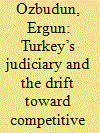

|
|
|
|
|
| Summary/Abstract |
Turkey has always been considered an “illiberal democracy”, or in Freedom House’s terms, a “partly-free” country. In recent years, however, there has been a downward trend toward “competitive authoritarianism”. Such regimes are competitive in that opposition parties use democratic institutions to contest seriously for power, but they are not democratic because the playing field is heavily skewed in favour of incumbents. One of the methods employed by competitive authoritarian leaders is the use of informal mechanisms of repression. This, in turn, requires a dependent and cooperative judiciary. Thus, in Turkey the year 2014 can be described as a period when the governing AKP (Justice and Development Party) made a sustained and systematic effort to establish its control over the judiciary by means of a series of laws of dubious constitutionality.
|
|
|
|
|
|
|
|
|
|
|
|
|
|
|
|
|
|
|
|
|